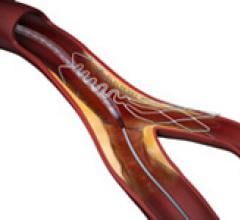June 30, 2010 – Thirty percent of cardiology information technology (IT) users are considering replacing their cardiovascular information system (CVIS) software because of ongoing frustrations with product functionality and integration, according to a new KLAS report released this week.
June 29, 2010 – A newly formed committee of experts has begun to tackle the issue of reducing radiation in computed tomography (CT). The panel was launched by Siemens Healthcare as a part of the Siemens Radiation Reduction Alliance (SIERRA).
June 28, 2010 – A new 3-D imaging technology is now available in the U.S. The C-InSight from Mazor Surgical Technologies Ltd. will enable medical facilities to incorporate 3-D imaging capabilities into their existing 2-D C-arms, the standard X-ray device used in operating rooms.
Cardiac PET/CT represents a major advancement in cardiovascular diagnostics, offering significant clinical and ...
June 28, 2010 – There is a growing consensus that radiologists must ensure that patients undergoing computed tomography (CT) receive the minimum radiation dose possible to produce a medical benefit, according to an article in the June 23 issue of the New England Journal of Medicine.
June 28, 2010 – Saint Francis Health System announced last week that it has chosen a new cardiology information system. Wolters Kluwer Health will provide its ProVation MD software for comprehensive cardiology procedure documentation and coding at Saint Francis Hospital.
June 28, 2010 – AGA Medical has been denied the right to appeal a decision in a United Kingdom patent case concerning structural heart occluders.
SPONSORED CONTENT — Studycast is a comprehensive imaging workflow system that allows healthcare professionals to work ...
June 24, 2010 – Tryton Medical Inc. announced that the company’s Tryton Side Branch Stent System has been used in three cases in Israel for the first time. Yaron Almagor, M.D., director of the interventional cardiology and cardiac catheterization laboratories at Shaare Zedek Medical Center in Jerusalem, Israel, performed the first implants.
June 24, 2010 – A new recorder upgrade will provide extended recording time for physicians, increasing their detection of abnormal heart rhythms in patients that could otherwise be missed. Midmark Corp. this week announced the release of an upgrade kit providing 48- and 72-hour recording capabilities for its IQholter recorders.
June 24, 2010 – The U.S. Food and Drug Administration (FDA) has cleared a new catheter and software for treating cardiac arrythmias. Biosense Webster Inc. announced yesterday that the FDA has cleared for marketing the CartoXPress Software Module and the Lasso NAV Circular Mapping Catheter for use with the Carto XP Mapping System.
Providing exceptional cardiovascular care for patients to achieve the best possible outcomes is the number one goal for ...
June 24, 2010 – The first cohort of patients was fully enrolled this week in a clinical study of a new drug meant to prevent restenosis in patients with peripheral arterial disease (PAD). Specifically, PVS-10200, developed by Pervasis Therapeutics, is supposed to keep PAD patients who undergo an angioplasty and stent procedure in the superficial femoral artery from developing restenosis.
June 24, 2010 – The National Institutes of Health (NIH) announced this week that it has given a $2.2 million grant to fund new treatment technology for atrial fibrillation (AF). The grant will allow Strategic Polymer Sciences Inc. (SPS) to design and commercialize its new steerable cardiac mapping and ablation catheter technology.
Radial access is very popular outside the United States because it offers improved safety, comfort and cost savings over femoral access, which is the current U.S. standard of care. Femoral access site recovery usually involves heavy, uncomfortable compression of the leg. Patients are also required to lay on their back, in bed and not move for hours to ensure proper hemostasis.
Cardiac positron emission tomography (PET) is growing in popularity among cardiologists because it provides the ability ...

St. Joseph's Hospital of Atlanta created a radial access recover room that replaces beds and the sterile institutional hospital look with a more patient-friendly design.
June 22, 2010 – Data from the FAST-PVI study, supported by Medtronic Inc., shows lab time using anatomically designed ablation catheters are more than one-third faster than traditional point-by-point focal ablation procedures in achieving pulmonary vein isolation (PVI).
June 22, 2010 – The U.S. Food and Drug Administration (FDA) recently granted 510(k) clearance for the Jetstream G3 Small Fixed (SF) peripheral atherectomy catheter. It is smaller than previous versions of the Jetstream, and offers a fixed cutter and longer catheter to treat blockages below the knee (BTK).

 June 30, 2010
June 30, 2010















